
What is Theology and What Should We Do with It? Two Theological Works That Shaped my Decade
In a simple five-word sentence laced with wisdom and insight, Katherine Sonderegger stopped me in my reading tracks. “Theology awakens a grateful heart” she penned in the opening sentence of her multi-volume Systematic Theology.[1] I wasn’t expecting such a devotional punch as I cracked my newly purchased and highly anticipated work from the Episcopalian theologian.
She is correct; theology does indeed awaken a grateful heart. As confusion gives way to clarity regarding the person and work of God, gratitude and worship arise in the believer. It is this reality which has led the past decade to be a rewarding one for me. From beginning to end, 2010 – 2019, I’ve been in the position of receiving formal theological education. Beginning my bachelor’s degree in Biblical Studies during the early stages of 2010 to winding down my Ph.D. in Systematic Theology at the close of 2019; one of the most consistent realities during these ten years is my status as a student.
For some, a decade of theological education sounds like a punishment unfit for any crime. For others, it sounds like grace upon grace. I’m happy to report that I’m in the latter camp and a major cog in God’s thousand gears of grace has been the reading I’ve done along the way. Theological literature allows us to join the cosmic conversation about Christ which has spanned centuries and continents. As the theological student moves his or her way through their educational journey, these books provide handrails and guides as we seek to most clearly communicate our Lord. Theological literature allows us to join the cosmic conversation about Christ which has spanned centuries and continents. Click To Tweet
Like any theology student, I’ve been on the receiving end of a thousand ideas from theological literature and am in the eternal debt of well-articulated writing. However, at the close of the decade, I wanted to highlight two modern books that have made the haze clear in largely incomparable ways for me. While there are hundreds of books I could list that have aided my theological journey—from patristics through the publications of 2019—these two modern volumes were ones God used in significant ways. Namely, one taught me what theology is, while the other taught me what I should do with it.
What is Theology?
Ironically enough, though I spent the entirety of this decade as a theological student, it was not until the latter half of the decade that I was introduced to a volume that has profoundly shaped how I would go about defining Christian Theology today. Little did I suspect when I first picked up his “working papers in Christian theology,” that John Webster’s volume God Without Measure, Volume 1, would reorient my theological perspective. There is much that Webster has given me as a theologian, and I’m sure many readers could say the same, yet, arguably most important of Webster’s gifts is that he simply made theology theological again.
Even in the opening lines of this wonderful volume, readers can sense Webster’s dogmatic vision and primacy of place for theology proper, “Christian theology is a work of regenerate intelligence, awakened and illuminated by divine instruction to consider a twofold object. This object is, first, God in himself in the unsurpassable perfection of his inner being and work as Father, Son and Spirit and in his outer operations, and, second and by derivation, all other things relative to him.”[2]
Webster here points his readers to the subject of theology—God. God’s life in himself, rooted in his eternal modes of subsistence, means that, as Webster says, all other dogmatic topics “by derivation” find their source in him. Protology, soteriology, eschatology, ecclesiology, anthropology and the like, all have their foundation in that great subject of the triune God and an important task of dogmatics is the articulation of these relations.
In a similar way that a student of the Bible must be a student of language, a student of any theological field must be a student of theology proper. For divine aseity means not only physical contingency of all matter but intellectual contingency of all truth. Webster taught me that the starting point of theology is theological itself. Where one decides to depart on the task of dogmatics, often charts the course from the very beginning, and Webster convinced me that theology proper is the port most appropriate to begin any theological voyage.
In sum, Webster’s God Without Measure, Volume 1, is a consistent reminder for me, and students of theology like me, of what theology is in its substance and method. Webster, through this volume, grabbed my theology and bent it Godward.
What Should We Do with Theology?
While Webster handed me the tools to properly define theology and theological method, another volume crafted my vision for what I was to do with it. I was a first-year seminarian, working towards my Master of Divinity, when I first cracked the cover of Kevin Vanhoozer’s, The Drama of Doctrine. There was a gravitational pull within me as I read Vanhoozer for the first time, and I fell deep into his paradigms and have not returned.
As a lover of creativity, I was susceptible to an imaginative premise like Vanhoozer’s, yet it wasn’t the creativity that kept me around, it was the beauty and practice. As Vanhoozer works through the contours of the theo-drama, describes the actor’s script in the word of God, and the cast in the people of God, he moves towards the performance of the drama. It is in Vanhoozer’s paradigm of performing the theo-drama that I found the answer regarding what to do with theology. He says, “Doctrine aids spiritual formation by training us to correspond in our speaking, thinking, and acting to the reality of what God is doing in Christ through the Spirit.” He continues and clarifies saying, “doctrine serves the project of spiritual formation by helping us better understand both the action and the actor in which and in whom we discover our true identities.”[3]
Elsewhere in the volume, Vanhoozer gets at this concept by describing theology as that which is “real.” In a world looking for authenticity and reality, theology knows the way. Doctrine provides the script for the cast seeking to live out the drama of God’s kingdom. Theology is, in this way, tremendously useful as it lifts the fog around reality and brings clarity to that which is true and false. This is good news for a culture in which deceptive scripts proliferate.
The practice of applying a script of reality to a world of falsehood is not just for the laity either. Sitting in the 2016 Scudder Lectures at Midwestern Baptist Theological Seminary, I first heard Vanhoozer articulate his vision of the pastor as a “minister of reality.”[4] Continuing in the paradigm of the theo-drama, a pastor is one who is called to know the script well and aid his people in playing their part with faithfulness. Doctrine aids this task as it provides the parameters on reality. Pastors are to lay hold of doctrine as the administer reality and shepherd their people away from the non-real roles they are tempted to fit themselves into.
So, what are we to do with theology? Use it. Use it to bring clarity to that which is real and eradicate that which is false. Use it to self-identify and bring lucidity to an identity rooted in union with Christ. Use it to learn the kingdom role of moving in the same rhythm as the triune God who is, in and through the person and work of Christ, redeeming all things to himself.
Conclusion
The past decade brought about the turning of thousands of pages in my personal life. As I ran through the hallways of the cosmic conversation of Christ, I made friends along the way in the form of books. Many of them became bricks God used to develop my dogmatic journey which is, I pray, far from over. Yet, two volumes that have acted as foundational were God Without Measure, Volume 1 by John Webster and The Drama of Doctrine by Kevin Vanhoozer.
These two theological works illuminated the question of what theology is and what we are to do with it. They instructed me, and will continue to instruct me, that the substance and form of theology is none other than God himself and that God intends us to lay hold of theology in order to administer reality and play our role in his kingdom.
Endnotes
[1] Katherine Sonderegger, Systematic Theology, Volume One, The Doctrine of God (Minneapolis: Fortress Press, 2015), vii.
[2] John Webster, God Without Measure: Working Papers in Christian Theology, Volume One (London: T&T Clark, 2016), 3.
[3] Kevin Vahoozer, The Drama of Doctrine: A Canonical Linguistic Approach to Christian Theology (Louisville: Westminster John Knox, 2005), 396.
[4] This is a thought he developed more in his co-authored volume, The Pastor as Public Theologian.

